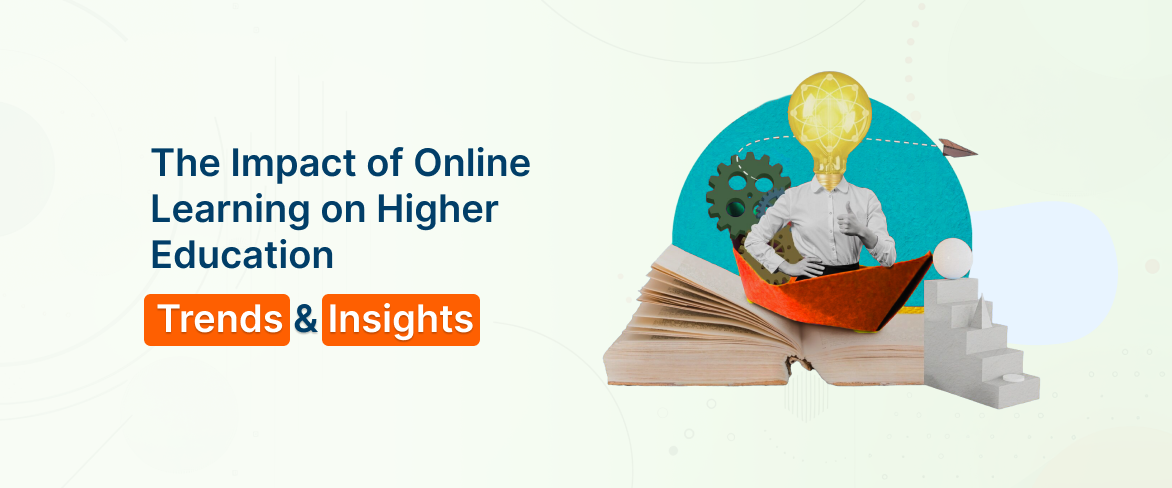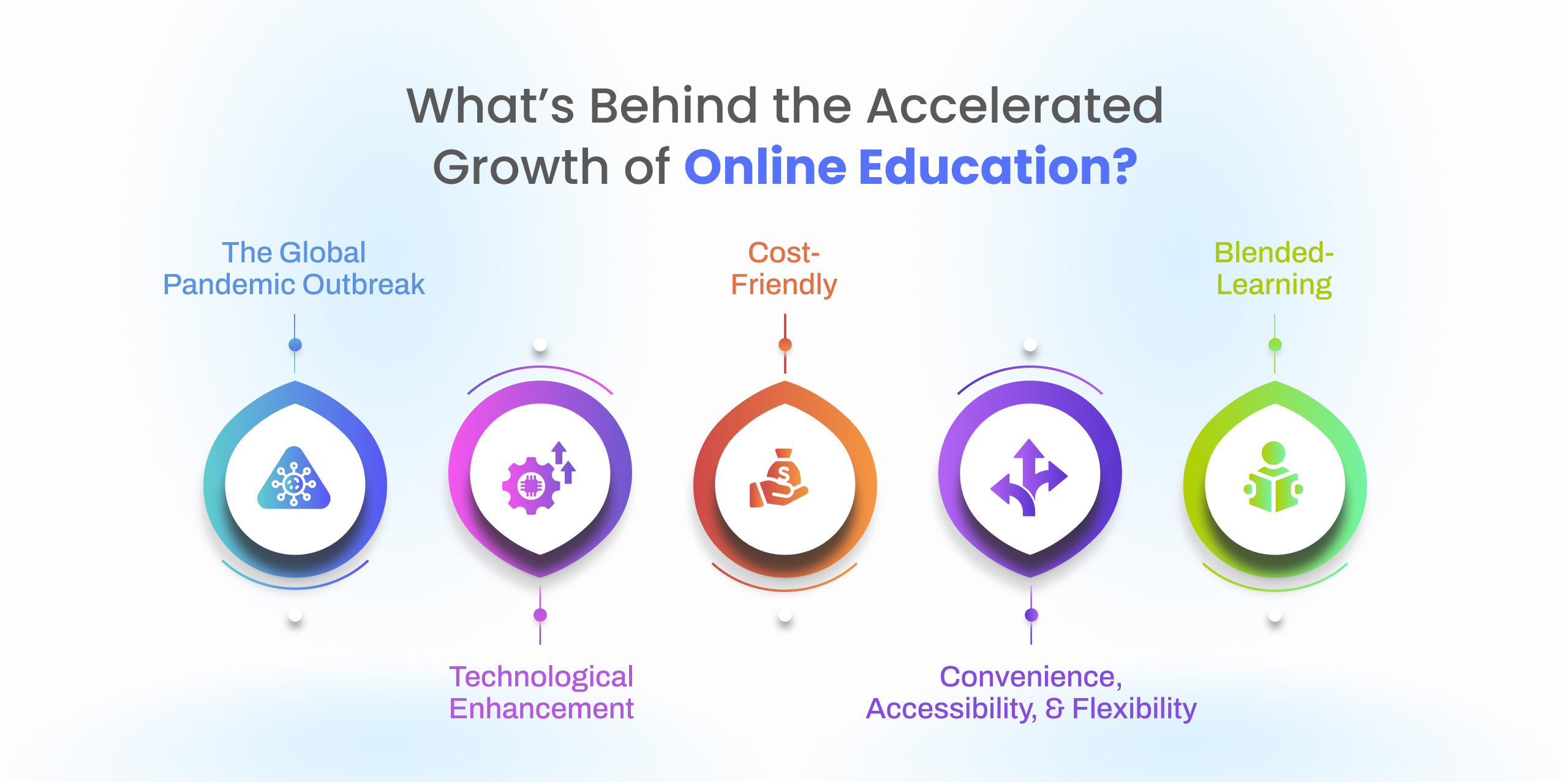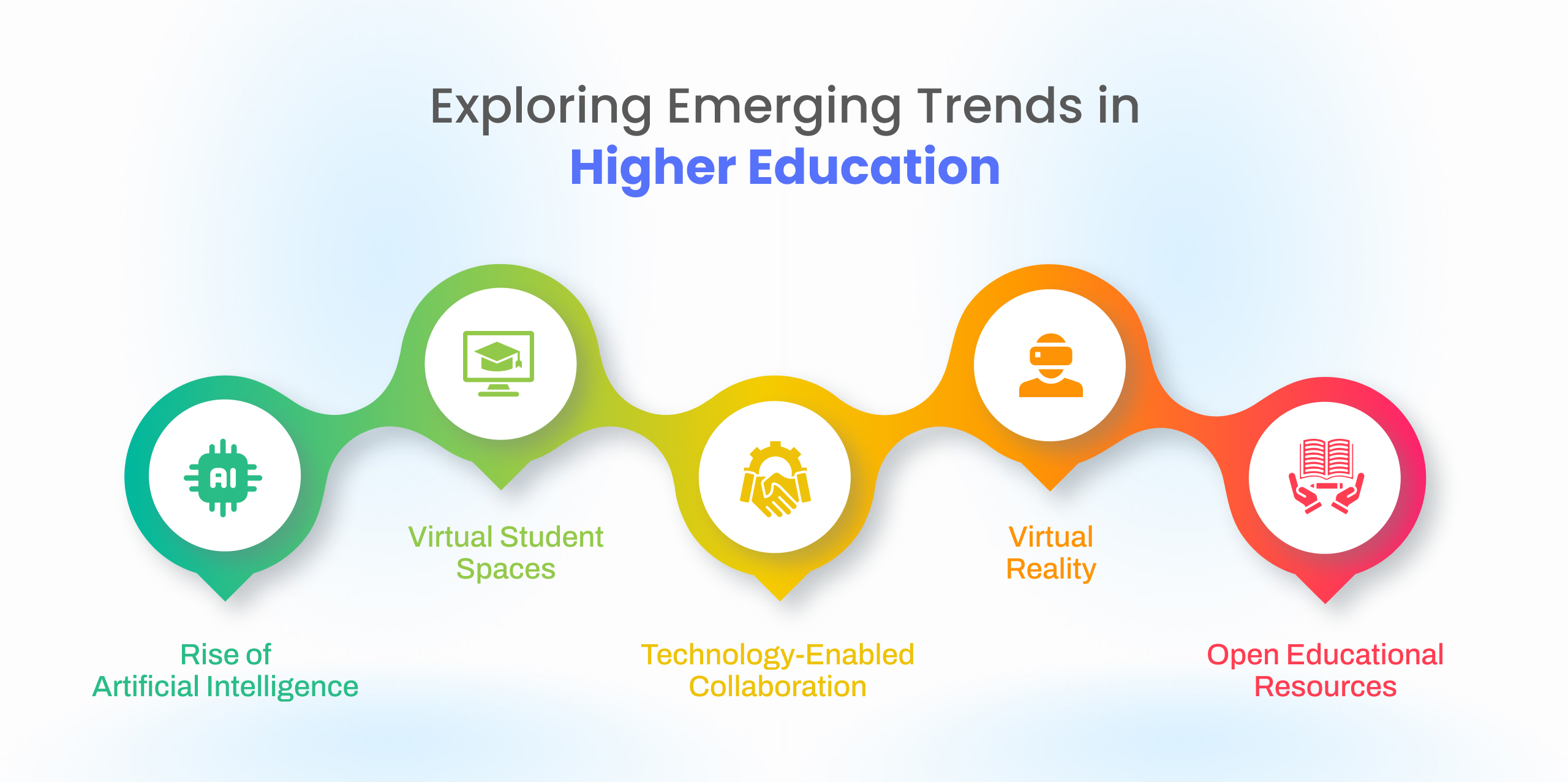
Table Of Contents
▲The Impact of Online Learning on Higher Education: Trends & Insights
The impact of online learning has fundamentally reshaped the landscape of higher education and offered unprecedented opportunities for students and institutions alike. The rise of digital technologies has made education more flexible, accessible and personalised, ensuring that every individual can acquire knowledge.
This blog will explore the benefits and impact of online learning on higher education, helping businesses navigate the ever-evolving sector effectively.
What’s Behind the Accelerated Growth of Online Education?

Here are the compelling reasons behind online learning growth in higher education: Let’s dive in to know more.
The Global Pandemic Outbreak:
The COVID-19 pandemic accelerated the growth of online learning out of necessity, as traditional in-person classes became impractical or nearly impossible. This unexpected change in shift compelled universities to adopt online platforms to maintain the continuity of education.
Convenience, Accessibility, and Flexibility:
Distance learning offers flexibility to access course materials and virtual lectures from anywhere with a fast internet connection. This enables students to manage their studies alongside work, family commitments, and other personal responsibilities.
Cost-Friendly:
Online learning often comes with a budget-friendly price compared to traditional on-campus programs. Plus, learners can save on expenses such as accommodation, textbooks, transportation, etc., making education more affordable and accessible.
Technological Enhancement:
The impact of online education has incredible advanced technology, from interactive multimedia content to seamless learning experience systems, which have greatly improved the quality and delivery of online education.
Blended learning:
Every student has unique learning preferences and needs. An online learning mode offers a blended learning approach where students can use learning analytics and AI algorithms to customise the learning experience, offering personalised recommendations, adaptive assessments and tailored content.
Exploring Emerging Trends in Higher Education

Let’s effectively understand the rising trends in higher education through the impact of online learning values.
Rise of Artificial Intelligence:
AI technologies, such as intelligent tutoring systems, chatbots and ChatGPT, offer learners personalised learning, ensuring they gain adaptive assessments and real-time student support. This technology enhances student engagement, facilitates self-paced learning, and leads to improved academic outcomes. Moreover, learners are currently surpassing faculty in the adoption of AI tools.
The Indian education landscape is experiencing a high surge in AI adoption for online learning. Indian students use a significant portion of AI in some form, with a considerable number (88%) using GenAI for assessments or project work.
For education solution providers, AI enables the development of innovative tools and platforms that cater to learners' needs. This is essential for maintaining competitiveness and staying relevant in the evolving online education landscape.
Virtual Reality:
The impact of online learning on higher education has introduced Virtual Reality (VR), which is revolutionising by inviting students to immerse themselves in an interactive simulated environment. Studies show that higher education leaders believe that trending technologies like VR and augmented reality will grow rapidly and improve student experience in the coming years.
This helps colleges and universities to enhance experiential learning, foster engagement and allow students to explore complex concepts. Moreover, businesses may develop VR mode and content to support universities by delivering immersive learning experiences.
Technology-Enabled Collaboration
Virtual classrooms, digital platforms, and project management tools facilitate seamless communication, teamwork among students and educators. This technology-based collaboration ultimately enhances engagement, fosters peer-to-peer learning, and promotes synergy in group projects.
Open Educational Resources
Open Educational Resources (OER) are freely accessible learning materials designed to support teaching and learning in higher education. Because these resources reside in the public domain or have been released under intellectual property license, they’re free to use or repurpose, promoting affordability, accessibility, and collaboration among educators and learners alike.
Businesses can contribute by creating and curating OER platforms, fostering knowledge and enhancing the accessibility of educational resources for all.
Virtual Student Spaces
Virtual student spaces are online platforms that recreate campus social environments, aimed at promoting community and engagement among remote learners. Such online environments facilitate networking, collaboration, and peer support, imagining the social aspects of regular campus life.
Education solution providers may consider integrating virtual student spaces into their platforms to enhance online student connectivity.
How Virtual Learning Trends Impact Education Service Providers
With the rise and evolution of digitalisation in educational institutions, innovations and adaptation are now key to meet the growing needs of higher education.
Explore its strategies to boost the effectiveness of your solutions and expand your outreach efforts amid the proliferation of distance learning.
Develop targeted marketing campaigns:
Customise your marketing strategies to target specific audience segments within the higher education sector. This approach guarantees that your messaging resonates with their preferences for virtual learning solutions. Leveraging comprehensive education data can help you accurately identify the right audience and gain deeper insights into their unique needs.
Offer free trials or product demonstrations:
Offer prospective clients the opportunity to experience your virtual learning solutions first. This gives them the proper decision-making chance to assess a solution's functionality, usability, and suitability for their needs before committing to a purchase.
Forge strategic partnerships:
Collaborate with educational institutions, technology providers or industry associations to expand your reach, access new markets and leverage complementary expertise that can enhance the value of your offerings.
Embrace emerging technologies:
Keep up with trending technologies relevant to remote learning, particularly virtual reality (VR) or augmented reality (AR). Look for ways to incorporate these innovations into your solutions to boost engagement and improve effectiveness.
Utilise Education Data Insights to Track Trends in Online Learning
It is crucial to harness the power of educational data insight to understand the evolution of the landscape of online learning in higher education. By analysing patterns in student engagement, course completion rates and learning outcomes, universities can adapt their strategies to meet the demands of today’s learners. This data-driven method allows educators to tailor virtual learning experiences, making them more interactive, accessible and practical.
The impact of online learning on higher education has been ever-changing. It has expanded access to education, introduced flexible learning routines, and enabled personalised learning paths. With the help of educational data, institutions can continue to refine these benefits, identify areas for improvement, and ensure that online education evolves to match the dynamic needs of students and educators alike.
Conclusion
The impact of online learning on higher education has set examples by offering numerous benefits such as interactive virtual discussions, recorded live sessions, peer discussion, access to e-books, etc. As institutions continue to navigate this transformation, it is essential to focus on maintaining education quality, fostering engagement and leveraging technology to enhance the learning experience.
Online learning has come a long way in offering an academic experience at a low price, helping students to grow in their career paths.
FAQ
How does the impact of online learning affect higher education?
What is the impact of online learning on the academic performance of students?
How does the internet affect your ways of learning?
Enroll with Us

Recent Blogs

 Online MBA in International Business Management
Online MBA in International Business Management23 June 2025

Confused about your career path?
Connect with an expert counsellor today!
LIFETIME FREE
Our Top Mentor

⭐ 4.7
Ravinder Kumar
4 years experience
Sr. Mentor MCA

⭐ 4.6
Anuj Chand
6 years experience
Sr. Mentor BBA

⭐ 4.6
Dhruv Pahwa
4 years experience
Sr. Mentor MCA

⭐ 4.8
Ruchi Parashar
5 years experience
Sr. Mentor BCA

Categories
- > Online MBA
- > Online MCA
- > Online M.Sc
- > Online BBA
- > Online BCA
- > Online BA
- > Online PGDM
- > Online Certifications
Trending Search
- > Online MBA Fees 2025
- > Online MBA Admission Process
- > Online MBA Syllabus
- > Online BBA Fees 2025
- > Online PGDM Fees 2025
- > Best Online PGDM Colleges in India
- > Best Online BCA Colleges
- > Online BCA Admission 2025
- > Online BA Admission Process
- > Best Online MA Programs
- > Best Online Universities in India
- > Online Degree Courses in India
- > Best Online Courses for Working Professionals
- > Career after Online MBA
- > Online BBA Program
Tags
- > Online learning fees
- > Online learning benefits
- > Online learning scope
- > Online learning insights
- > Online learning trends

At MBA Query, we are delighted to help students with their admission journey. We offer proper guidance on choosing management programs, selecting ideal specialisations, and crafting a smooth, step-by-step application.
Top Universities
Best Online Courses
Opening Hours
10:00 AM - 7:00 PM
Monday - Saturday
Info@mbaquery.com
Cities
Mumbai | Hyderabad | Gurugram | Jaipur
Resources
Reviews | Admission Guides | Career Counseling | Scholarship Assistance
Enroll with Us




